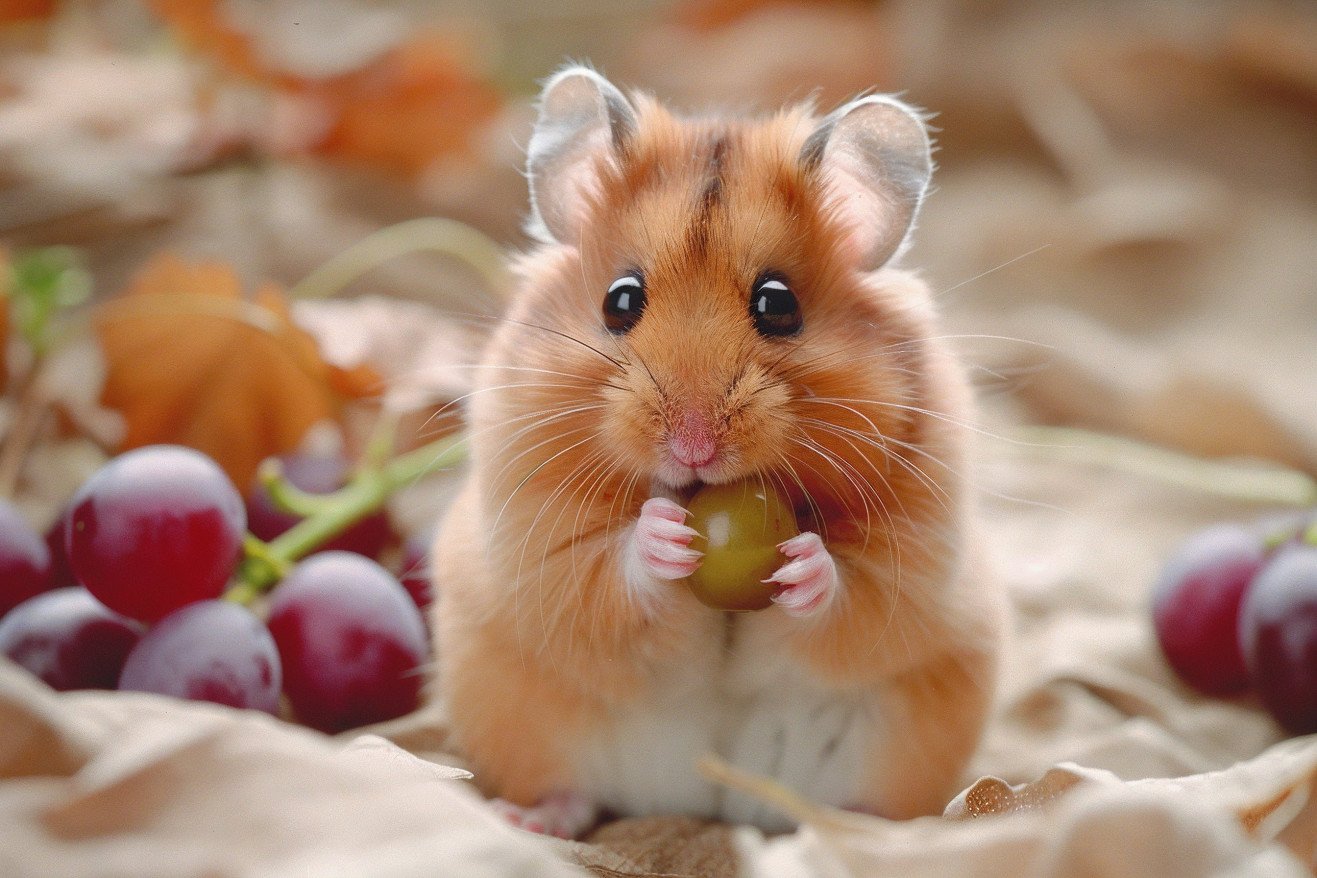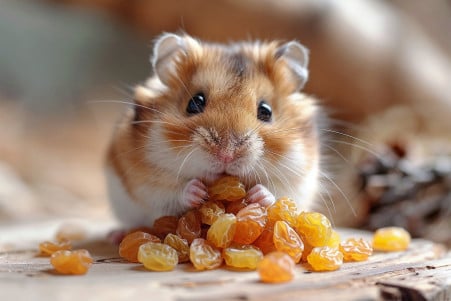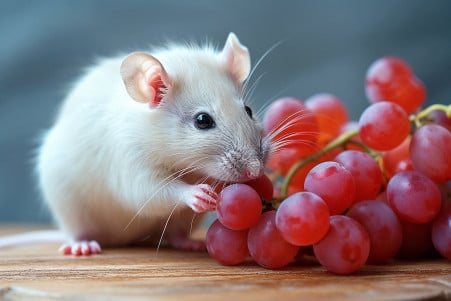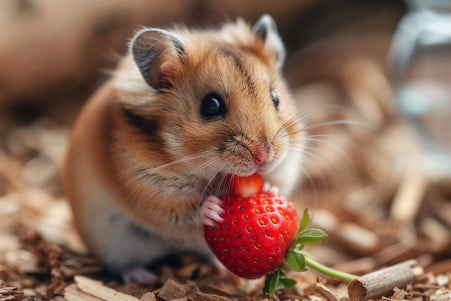Can Hamsters Eat Grapes? Safe Amounts & More
17 March 2024 • Updated 15 March 2024

It’s no secret that fruit can be a delicious and healthy way to satisfy a sweet tooth, but can hamsters partake in the sugary goodness of grapes? While hamsters can eat grapes, they should only be given to them in moderation and as an occasional treat because of their high sugar content.
That said, it’s also important to make sure that you only give your hamster a small amount at a time and that you watch them closely after they eat it to make sure they don’t experience any health issues like obesity or digestive problems.
Finally, make sure to take any uneaten grapes out of your hamster’s cage to prevent them from going bad and causing health issues.
In this article, we’ll take a deep dive into this topic, drawing on a variety of veterinary sources and nutritional research on the dietary habits of small mammals to help explain the physiology of hamsters, their dietary requirements, and what it means to add fruit, including grapes, to their diet. Armed with this information, you can make sure that you’re feeding your hamster a diet that’s both healthy and nutritionally complete.
Can hamsters eat grapes?
Know the Basics of Hamster Nutrition
In order to make sure that your hamster lives a long and healthy life, it’s important to know the basics of what they need to eat. Hamsters are omnivores, and in the wild, they eat a variety of plant-based foods and insects for protein.
According to The Spruce Pets, a well-rounded diet for a pet hamster will include a combination of pellets, seeds, fresh foods, and the occasional treat. The foundation of your hamster’s diet should be pellets, and you can add to that with a seed mix.
According to The Spruce Pets, fruits should make up about 20% of a hamster’s diet and are therefore a smaller part of their diet. You can feed your hamster fresh, washed fruits like apples, berries, and other fruits from the grocery store on a daily basis in small amounts.
However, it’s important to note that citrus fruits are toxic to hamsters, so you should never feed them to your pet. The PDSA agrees, suggesting non-citrus fruits in small amounts to add variety and extra nutrition.
This balance is important because it will help prevent your hamster from developing health problems like diabetes and obesity. By offering a variety of safe fruits and vegetables in addition to their main diet, you’ll be meeting your hamster’s nutritional needs while also providing them with mental stimulation as they forage and chew. This well-rounded approach will help ensure that your hamster lives a long and healthy life.
Grapes: A Healthy Snack with a Few Warnings for Hamsters
While grapes are a hydrating fruit that contains antioxidants and vitamins that can be good for your hamster’s health, the high sugar content of grapes means that they should be fed with caution.
In particular, the fructose in grapes, a type of sugar, can lead to obesity and metabolic problems in rodents when consumed in high amounts, according to a study by Miguel A. Lanaspa that was published in PMC.
This is backed up by a study by James S. Ruff that was published in Nature Communications, which found that even levels of added sugar that are similar to those in the human diet can lead to a reduction in overall health and fitness in mice.
While the antioxidants in grapes can help to reduce free radicals in the body and, as a result, potentially reduce the risk of certain diseases, the dangers of consuming too much sugar can’t be ignored. An article in ScienceDirect has shown the cognitive and behavioral impact of sugar on rodents, which could lead to dysfunction even with moderate sugar intake.
In light of this research, it’s best for hamster owners to feed grapes in moderation, offering them as an occasional snack rather than a regular part of the diet. A small piece of grape, about the size of a pea, offered once or twice a week, will help ensure that your hamster doesn’t experience the health problems that can come from eating too many grapes.
Always monitor your pet for any adverse reactions to new foods and talk to a vet for personalized dietary recommendations.
Risks of Overfeeding Grapes to Hamsters
While grapes can make a delicious treat for hamsters, it’s important to be careful not to overfeed them. If hamsters eat too many grapes, they can experience short-term health problems, such as diarrhea, due to the high sugar content that can throw off their digestive system. This advice from The Spruce Pets is important because hamsters have sensitive digestive systems that can be thrown off by too much of an otherwise healthy food.
In the long term, the natural sugars in grapes can lead to obesity and other health issues, including diabetes. The RSPCA notes that hamsters need a balanced diet and warns against foods that are high in sugar, like grapes.
This makes it important to keep an eye on your hamster’s weight and eating habits. Look for signs of obesity, including a rounded body shape and difficulty moving around. If your hamster seems less active or seems to be having digestive issues, it may be time to reevaluate its diet.
Keep your hamster healthy by feeding it grapes in moderation and paying close attention to how it responds. Make sure to provide a balanced diet that includes appropriate fruits, vegetables, and proteins to help your hamster stay healthy and avoid dietary issues.
How to Feed Grapes to Your Hamster
Because of the potential risks, it’s important to be mindful of how you introduce grapes into your hamster’s diet. To avoid choking, make sure the grapes you’re feeding your hamster are seedless. You should also wash the grapes thoroughly to remove any pesticides or bacteria.
According to UKPets, the recommended portion size for grapes will depend on the type of hamster you have. Syrian hamsters can have one grape a week, Roborovski hamsters can have up to half a grape a week, and dwarf hamsters like Chinese hamsters can have up to one-sixth of a grape a month.
Start by giving your hamster a very small portion of a grape, about the size of a pea. PetMD notes that because of the sugar content in grapes, it’s important to feed them to your hamster in moderation and as an occasional treat.
After you feed your hamster grapes, make sure to watch them closely for any signs of digestive issues or allergies. If you notice any negative side effects like diarrhea or a lack of energy, contact your vet right away.
Both Petkeen and Petsolino experts suggest that you should feed your hamster grapes as part of a balanced and diverse diet, and you should alternate grapes with other fruits like apples and bananas.
This slow and cautious approach is designed to help ensure that you get the most out of the potential health benefits of grapes while minimizing the risks, and it will help ensure that grapes are seen as a special treat instead of a regular part of your hamster’s diet.
Final Thoughts on Hamsters and Grapes
As we’ve learned throughout this article, hamsters can eat grapes, but there are a few important things to keep in mind. Both the RSPCA and The Spruce Pets stress the importance of portion control and the dangers of high-sugar foods. As a result, the Ontario Hamster Club recommends feeding grapes to hamsters only occasionally and in small amounts, no bigger than a hamster’s ear.
It’s important to pay close attention to your hamster’s health and how they react to the grapes when you introduce them to their diet. Since every hamster is different, it’s important to pay close attention and be willing to adjust their diet to make sure they’re getting what they need.
A diet that’s primarily made up of pellets and seeds, with fruit as a smaller part of their diet, will help you make sure your hamster stays healthy and avoids the problems that can come with eating too many sugary treats.
As responsible pet owners, it’s up to us to make sure we’re making the best choices for our pets when it comes to the food we give them. By sticking to the portion sizes and frequency recommendations, we can make sure our hamsters are happy and healthy. And, of course, if you’re ever in doubt, talk to your vet for personalized nutritional guidance for your pet.


